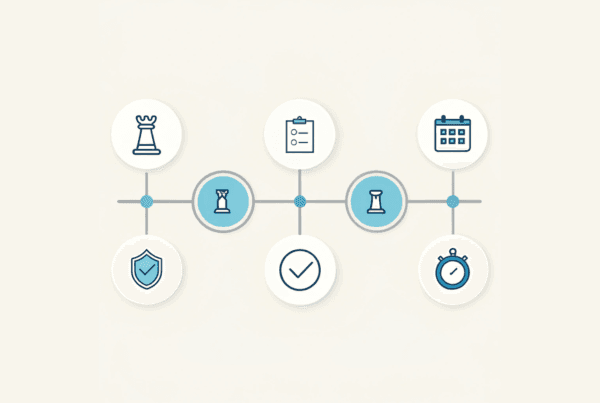
Selling your healthcare practice to a private equity firm is one of the most critical financial decisions of your career. You are an expert in delivering exceptional patient care, but a high-stakes M&A transaction requires a different type of specialist. While you focus on maintaining your practice’s performance, a dedicated advisor works to secure your financial future.
This process involves more than just finding a buyer; it is about finding the right buyer at the best valuation and terms. For practice owners exploring this path, understanding the guide to private equity in healthcare is the first step. The second is recognizing who should lead your team through the transaction.
The Quarterback of Your Transaction: Defining the Healthcare M&A Advisor
When you decide to sell your practice, you will assemble a team of experts, including lawyers and accountants. A healthcare M&A advisor, or investment banker, acts as the quarterback for this team. Their job is to design and execute the game plan, coordinating every player to move the deal across the goal line while protecting your interests.
Their role is fundamentally different from that of other professionals you rely on. A lawyer ensures legal and regulatory soundness, and a CPA verifies financial accuracy. An M&A advisor, however, focuses on market strategy, deal architecture, and process management to create a competitive environment that maximizes your outcome.
Here is how the roles differ in a typical practice sale:
| Professional | Primary Role in a Transaction | Key Focus |
|---|---|---|
| M&A Advisor | Manages the entire sale process from valuation to closing. | Maximizing valuation, creating competitive tension, negotiating financial terms. |
| Healthcare Lawyer | Drafts and reviews legal documents, advises on regulatory risk. | Mitigating legal liability, ensuring compliance with healthcare laws. |
| CPA/Accountant | Prepares and validates financial data, advises on tax implications. | Financial accuracy, tax efficiency, Quality of Earnings (QoE) support. |
| Business Broker | Lists the business for sale, often to a broad, local market. | Finding a buyer, often with less focus on strategic fit or max value. |
A general business broker might find a buyer, but a specialized healthcare M&A advisor understands the unique dynamics of private equity. They are experts in investment banking in healthcare deals and know what PE firms look for, how they value practices, and what it takes to get a deal done on optimal terms.
The Core Functions: How an Advisor Creates Value in a PE Deal
An experienced advisor adds value at every stage of the sale. Their work can be broken down into four essential functions that directly impact your final outcome.
1. Strategic Preparation & Narrative Framing
Sophisticated buyers, especially private equity firms, purchase the future of your practice, not just its past performance. An advisor helps you prepare for this scrutiny. They work with you to perform an initial valuation and “engineer” your financials by making proper adjustments to your earnings. This process, detailed in our EBITDA normalization guide, presents your practice’s true profitability.
They also help you craft a compelling growth story. This narrative highlights untapped potential, such as new service lines, de-risked provider models, or opportunities for geographic expansion, which is crucial for attracting premium valuation multiples.
2. Unrivaled Access to the Right Buyers
An unsolicited offer from a single buyer rarely represents your practice’s top market value. An M&A advisor runs a confidential, structured, and competitive process. They leverage deep industry relationships and proprietary databases to identify and approach a curated list of the most qualified strategic and financial buyers, including PE firms and MSOs actively acquiring in your specialty.
This creates a competitive dynamic—or a “bidding war”—that drives up the price and gives you leverage to negotiate better terms on everything from your post-close role to non-compete clauses.
3. Expert Negotiation & Deal Structuring
The highest offer is not always the best one. An advisor helps you analyze complex deal structures involving cash, rollover equity, earnouts, and seller financing. Their experience is vital when advisors support deal negotiations, allowing them to model the net financial outcome of each offer so you can make a fully informed decision. They manage the high-stakes negotiations, insulating you from the back-and-forth and allowing you to maintain a positive relationship with your future partner.
4. Navigating Healthcare-Specific Complexities
Healthcare transactions are layered with regulatory hurdles. An advisor who specializes in this sector is fluent in the challenges posed by the Corporate Practice of Medicine doctrine and knows how to manage diligence related to Stark Law and Anti-Kickback statutes. They act as the central point of contact, coordinating with specialized legal counsel and compliance experts to ensure a smooth and compliant process, minimizing the risk of a deal falling apart during diligence.
The Advisor’s Role Throughout the Transaction Timeline
From the initial thought of selling to the day the funds are wired, your M&A advisor guides you through each phase of the private equity transaction timeline.
-
Phase 1: Preparation & Strategy (First 30–90 Days)
Your advisor begins by conducting a deep financial and operational analysis. They build the financial models, prepare the marketing materials (like the Confidential Information Memorandum or CIM), and help you define your ideal exit structure and post-close goals. -
Phase 2: Go-to-Market & Buyer Engagement
With your approval, the advisor confidentially contacts a list of vetted buyers. They manage all communications, answer initial questions, collect Non-Disclosure Agreements (NDAs), and schedule introductory meetings between you and the most promising potential partners. -
Phase 3: Offers & Negotiations
The advisor solicits Letters of Intent (LOIs) from multiple interested parties. They then lead the process of comparing offers, negotiating key terms, and helping you select the best partner—not just based on price, but also on cultural fit and strategic alignment. -
Phase 4: Due Diligence & Closing
This is often the most intense phase. Your advisor manages the virtual data room, coordinates responses to the buyer’s extensive information requests, and works in lockstep with your lawyers and accountants to navigate final negotiations on the definitive agreements. Their job is to keep the process on track and solve problems before they can derail the closing.
The Financial Case for Hiring a Sell-Side Advisor
Engaging a top-tier M&A advisor is a significant investment, but it is one that should yield a substantial return. The value an advisor creates through a competitive process almost always results in a higher sale price that far exceeds their fee. A well-run process can increase a practice’s final valuation by 15-25% or more compared to a direct offer from a single buyer.
Beyond the numbers, advisors save you time, reduce stress, and mitigate risk, allowing you to remain focused on running your practice. The specifics of medical practice broker fee arrangements often align the advisor’s compensation with your success, ensuring they are motivated to achieve the best possible outcome for you.
Choosing to sell your practice is a monumental step. Partnering with an expert M&A advisor ensures you have the strategic guidance, market access, and negotiation expertise needed to turn your life’s work into a lasting legacy.
Ready to explore your options? Learn more about our healthcare M&A advisory services and how we help practice owners navigate successful transactions.
Frequently Asked Questions
What is the role of an investment banker or M&A advisor in selling a healthcare practice?
An investment banker or healthcare M&A advisor acts as the quarterback of your transaction. They manage the entire sale process, from valuation through negotiation to closing, orchestrating the various team members such as lawyers and accountants. Their primary role is to maximize your practice’s value by creating a structured, competitive process with qualified buyers and negotiating favorable financial terms on your behalf.
Why should I hire a healthcare M&A advisor instead of relying on my lawyer or accountant for the sale?
While your lawyer ensures legal compliance and your accountant verifies financial accuracy, a healthcare M&A advisor specializes in market strategy and process management for practice sales. They have unrivaled access to qualified private equity buyers and create a competitive bidding environment that often leads to higher sale prices and better deal terms. They protect your interests throughout the transaction and navigate complex healthcare regulations that lawyers and accountants might not manage fully.
What specific tasks does a healthcare investment banker handle during the practice sale process?
A healthcare investment banker handles several key tasks including:
- Preparing and framing the narrative and financials (like EBITDA normalization) to attract premium buyers.
- Running a competitive, confidential marketing process to identify and engage the right buyers.
- Negotiating deal terms such as cash, earnouts, rollover equity, and employment agreements.
- Managing regulatory and healthcare-specific complexities by coordinating with legal counsel and compliance experts.
- Guiding the process from preparation, marketing, offer solicitation, negotiation, through due diligence and closing.
Can an advisor really secure a higher price for my healthcare practice?
Yes, a well-managed process led by an experienced healthcare M&A advisor typically results in a higher sale price. By creating a competitive bidding environment and carefully structuring deals, advisors can increase your practice’s valuation by 15-25% or more compared to single, unsolicited buyer offers. Their expertise in crafting compelling growth stories and navigating negotiations plays a critical role in locking in premium valuations.
How does a healthcare investment banker navigate the complexities of healthcare regulations during a sale?
Healthcare investment bankers understand the industry-specific regulatory challenges like Stark Law, Anti-Kickback statutes, and the Corporate Practice of Medicine doctrine. They serve as the central coordinator, working closely with specialized legal counsel and compliance experts to ensure the transaction complies with all healthcare laws. This minimizes the risk of regulatory issues arising during buyer diligence and helps keep the deal on track toward closing.



